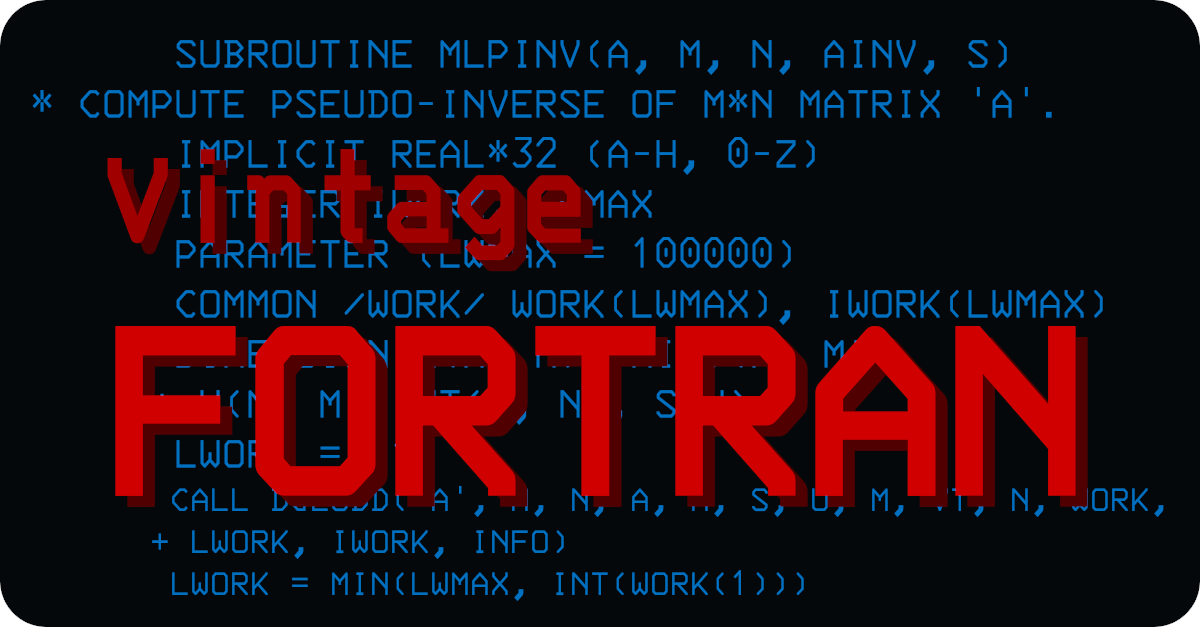box-behnken.f
1 ! @section Synopsis
2 !
3 ! Box-Behnken design related subprograms.
4 !
5 ! @author J. Marcel van der Veer
6 !
7 ! @section copyright
8 !
9 ! This file is part of VIF - vintage fortran compiler.
10 ! Copyright 2020-2025 J. Marcel van der Veer <algol68g@xs4all.nl>.
11 !
12 ! @section license
13 !
14 ! This program is free software; you can redistribute it and/or modify it
15 ! under the terms of the gnu general public license as published by the
16 ! free software foundation; either version 3 of the license, or
17 ! (at your option) any later version.
18 !
19 ! This program is distributed in the hope that it will be useful, but
20 ! without any warranty; without even the implied warranty of merchantability
21 ! or fitness for a particular purpose. See the GNU general public license for
22 ! more details. You should have received a copy of the GNU general public
23 ! license along with this program. If not, see <http://www.gnu.org/licenses/>.
24 !
25 SUBROUTINE box_behnken (dim_num, x_num, range, x)
26
27 c box_behnken() returns a Box-Behnken design for the given number of factors.
28 c
29 c Licensing:
30 c
31 c This code is distributed under the MIT license.
32 c
33 c Modified:
34 c
35 c 26 October 2008
36 c
37 c Author:
38 c
39 c John Burkardt
40 c
41 c Reference:
42 c
43 c George Box, Donald Behnken,
44 c Some new three level designs for the study of quantitative variables,
45 c Technometrics,
46 c Volume 2, pages 455-475, 1960.
47 c
48 c Parameters:
49 c
50 c Input, integer DIM_NUM, the spatial dimension.
51 c
52 c Input, integer X_NUM, the number of elements of the design.
53 c X_NUM should be equal to DIM_NUM * 2**(DIM_NUM-1) + 1.
54 c
55 c Input, double precision RANGE(DIM_NUM, 2), the minimum and maximum
56 c value for each component.
57 c
58 c Output, double precision X(DIM_NUM, X_NUM), the elements of the design.
59 c
60 IMPLICIT none
61
62 INTEGER dim_num, x_num, i, i2, j, last_low
63 DOUBLE PRECISION range(dim_num, 2), x(dim_num, x_num)
64 c
65 c Ensure that the range is legal.
66 c
67 DO i = 1, dim_num
68 IF (range(i, 2) .le. range(i, 1)) THEN
69 CALL xerabt ('BOX_BEHNKEN range error', 1)
70 END IF
71 END DO
72 c
73 c The first point is the center.
74 c
75 j = 1
76
77 DO i = 1, dim_num
78 x(i, j) = (range(i, 1) + range(i, 2)) / 2.0d+00
79 END DO
80 c
81 c For subsequent elements, one entry is fixed at the middle of the range.
82 c The others are set to either extreme.
83 c
84 DO i = 1, dim_num
85
86 j = j + 1
87
88 DO i2 = 1, dim_num
89 x(i2, j) = range(i2, 1)
90 END DO
91 x(i, j) = (range(i, 1) + range(i, 2)) / 2.0d+00
92 c
93 c The next element is made by finding the last low value, making it
94 c high, and all subsequent high values low.
95 c
96 1 CONTINUE
97
98 last_low = -1
99
100 DO i2 = 1, dim_num
101 IF (x(i2, j) .eq. range(i2, 1)) THEN
102 last_low = i2
103 END IF
104 END DO
105
106 IF (last_low .eq. -1) THEN
107 GO TO 2
108 END IF
109
110 j = j + 1
111 DO i2 = 1, dim_num
112 x(i2, j) = x(i2, j-1)
113 END DO
114 x(last_low, j) = range(last_low, 2)
115
116 DO i2 = last_low + 1, dim_num
117 IF (x(i2, j) .eq. range(i2, 2)) THEN
118 x(i2, j) = range(i2, 1)
119 END IF
120 END DO
121
122 GO TO 1
123
124 2 CONTINUE
125
126 END DO
127
128 RETURN
129 END
130
131 SUBROUTINE box_behnken_size (dim_num, x_num)
132
133 c box_behnken_size returns the size of a Box-Behnken design.
134 c
135 c Licensing:
136 c
137 c This code is distributed under the MIT license.
138 c
139 c Modified:
140 c
141 c 26 October 2008
142 c
143 c Author:
144 c
145 c John Burkardt
146 c
147 c Reference:
148 c
149 c George Box, Donald Behnken,
150 c Some new three level designs for the study of quantitative variables,
151 c Technometrics,
152 c Volume 2, pages 455-475, 1960.
153 c
154 c Parameters:
155 c
156 c Input, integer DIM_NUM, the spatial dimension.
157 c
158 c Output, integer X_NUM, the number of elements of the design.
159 c X_NUM will be equal to DIM_NUM * 2**(DIM_NUM-1) + 1.
160 c
161 IMPLICIT none
162
163 INTEGER dim_num, x_num
164
165 IF (1 .le. dim_num) THEN
166 x_num = 1 + dim_num * 2 ** (dim_num - 1)
167 ELSE
168 x_num = -1
169 END IF
170
171 RETURN
172 END
|
© 2002-2025 J.M. van der Veer (jmvdveer@xs4all.nl)
|


